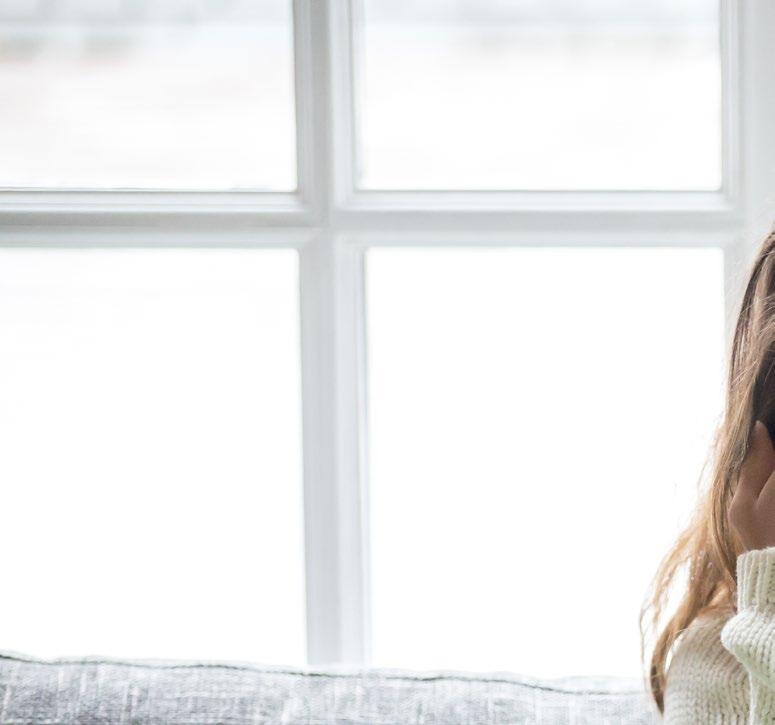
4 minute read
Managing Stress and Anxiety




With coronavirus (COVID-19) and all the uncertainty that surrounds it, new terms such as “social distancing” and “flattening the curve” have become our new normal – for now, anyway.
Our everyday routines have changed significantly, normal in-person support systems are now more distant and many of our favorite places to visit are closed until further notice. Inevitably, scenarios such as these can take a toll on one’s mental health. Yet, let’s all take a collective deep breath and know that during this unprecedented time, it's normal to not feel OK.

It’s OK to Not Feel OK While stress during a time like this is normal, coping with it in a positive way will ultimately help strengthen your emotional health. “There are certainly some practical steps you can take—at any age—to reduce fear and anxiety about COVID-19,” says Kurt

VanMatre, a licensed professional counselor and director of the outpatient clinic at Laureate Psychiatric Clinic and Hospital. “The number one thing you can do is put down your phone—and set some limits on the amount of news and information you are consuming about the situation.” According to the Centers for Disease Control and Prevention (CDC), stress during an infectious disease outbreak can include: • fear and worry about your health and the health of your loved ones; • changes in sleep or eating patterns; • difficulty sleeping or concentrating; • worsening of chronic health problems; and • increased use of alcohol, tobacco or other drugs.

“If you notice a loved one having a hard time, simply ask them how they are doing,” VanMatre says. “They may or may not want to talk about it—but knowing someone cares enough to ask generally means a lot.” Other recommendations for coping with the stress include: • Take care of your body. Take deep breaths, stretch or meditate. Try to eat healthy, well-balanced meals, exercise regularly, get plenty of sleep and avoid alcohol. • Make time to unwind. Try to do some other activities you enjoy. • Connect with others online or call someone. Talk with people you trust about your concerns and how you are feeling. • Call your primary care physician if stress gets in the way of your daily activities for several days in a row.
Mental health professionals at Laureate Psychiatric Clinic are offering video visits for established outpatients.







For more information, or to schedule an appointment at Laureate, please call 918-481-4000.
Overwhelmed with Emotions? People respond differently to times like these and how you respond may not be the same as your partner, child, co-worker or neighbor. The CDC reports that the groups most likely to respond strongly to the stress of COVID-19 include: • older people and people with chronic diseases who are at higher risk for
COVID-19; • children and teens; • professionals who are responding to the public health crisis, like nurses, doctors and other healthcare providers and first responders; and • people who have existing mental health conditions including problems with substance abuse. “Information changes rapidly and there’s still a lot we don’t know about COVID-19,” VanMatre says. “It’s normal to feel uncertain and scared. Staying in that scary space too long though, isn’t good for anyone. Acknowledge what you can control during this time, and if you’re struggling to function, it’s time to ask for help.”
When this is over. It may seem like the COVID-19 fears and anxieties developed overnight, don’t be concerned if they take a while to subside— this is normal. It’s also common for people to have a delayed emotional reaction to stressful events. Feelings of fear, sadness or anxiety can develop weeks, months and even years after a traumatic event. There is no time frame on healing and no deadline to seek support. When this is over, you’ll have been through a lot and a lot will have changed in the world around you. Be gentle with yourself and remember it is ok to ask for help now…and later.
*Source: Centers for Disease Control and Prevention (cdc.gov)
The Oklahoma State Department of Health has established a hotline for those who may be experiencing emotional distress related to COVID-19: 1-800-985-5990



If you or someone you know is overwhelmed and suffering from severe depression, anxiety or may harm themselves, please call: 911 in case of emergency







